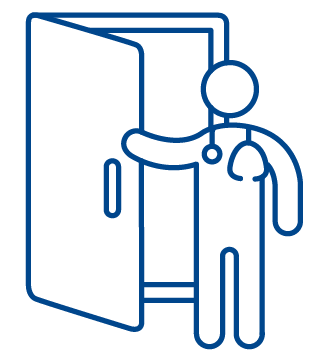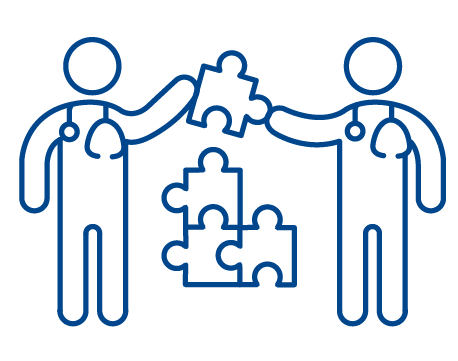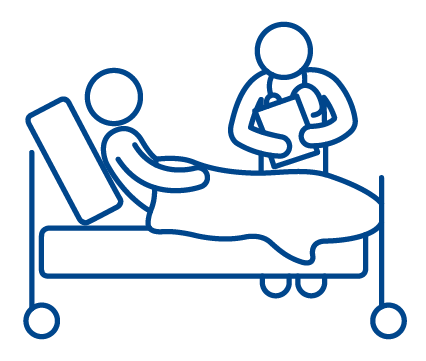Boston Children’s Hospital is committed to providing lifelong learning that allows nurses from all levels to develop and expand competence in their professional nursing practice and to support their needs.
Our Nursing/Patient Care team is devoted to ensuring the professional development of nurses and offers benefits, such as continuing education and professional advancement programs, peer review, as well as tuition and conference reimbursement.
Starting your nursing career at Boston Children's
Boston Children’s Nursing Department offers programs with tailored orientation and training opportunities for registered nurses, advanced practice registered nurses (APRNs) and unlicensed assistive personnel.
Nurses undergo a comprehensive orientation period to introduce them to Boston Children's and to provide them with the information and support they need to succeed here.
This orientation period begins with a full day instructor-led class for all new hires, and includes cutting-edge simulation experiences, computer-based learning courses and highly specialized unit-based orientation. The direct supervisor determines which courses are appropriate for their staff.
The Transition to Nursing Practice Program at Boston is a comprehensive, year-long program for all newly licensed nurses. The program supports their transition from the academic setting to the clinical practice setting and offers opportunities for them to develop.
The program is offered five times a year (March, May, August, September, and November) and in addition to the practice-based precepted experience, includes nine seminar days with a variety of topics, such as skill-building around communication in the clinical environment, working with interprofessionals, and learning about Boston Children's resources.
To be considered for a newly licensed nurse position at Boston Children’s Hospital, please apply to the Transition to Nursing Practice Program, New Graduate RN position that will be posted on our website.
Boston Children’s Nursing Department invests in building and supporting programs that facilitate structural empowerment and is committed to growing a diverse professional workforce.
The Career Lattice program provides clinical assistants, administrative staff and other racially and ethnically diverse hospital employees who want to pursue a career in nursing with academic counseling, mentoring and financial support so they can be successful in nursing school.
The program helps create a robust multicultural workforce that can provide the best family-centered care to our patients and the community. Watch a video about the Career Lattice Program.
Developing skills for advancing your career
Ongoing professional development activities at Boston Children’s are implemented and directed by our dedicated Nursing Education team and include role transition courses, simulation learning and skill-building labs that help nurses reach their goals, both inside and outside the workplace.
The Nursing Education Team plans, implements, evaluates and maintains an ongoing program of professional development and education for Nursing/Patient Care. Boston Children’s is one of the few freestanding hospitals to have achieved Joint Accreditation for Continuing Education.
Via this accreditation, we provide approved continuing education credit to multiple professions: Nursing, Medicine, Pharmacy, Physician Assistants and Optometry — and more to come. Continuing education programs are held throughout the year in all practice settings.
Additionally, Boston Children’s affiliates with over 30 different schools of Nursing to provide clinical experiences, senior practicums and graduate level precepted experiences.
All clinical staff members participate in a yearly competency assessment and verification process that is based on the Donna Wright Model. Clinical staff in all areas participate in the selection of competencies specific to their practice setting, and then determine appropriate validation methods. The process is dynamic and role-specific, offering the maximum amount of clinical staff control.
A wide variety of educational programs are available for staff in various role transitions, such as going from a Level I staff nurse to a Level II staff nurse, transitioning from clinician to management roles or moving from new grad to preceptor. Some of the regular programs we offer include:
- Charge nurse workshops
- Preceptor and advanced preceptor workshops
- How to have difficult conversations for charge nurses and preceptors
- Skill-building for new and emerging leaders
- Nursing Grand Rounds
- Orientation to our Professional Practice Governance councils, including Informatics; Practice, Quality & Outcomes; Dissemination; and Professional Development
Opportunities for experienced nurses
Along with ongoing educational courses, Boston Children’s offers dynamic opportunities aimed at highly motivated nurses to help them gain a wealth of knowledge and experience through mentored scientific inquiry and nursing fellowships, as well as clinical advancement for Advanced Practice Registered Nurses (APRNs).
Evidence-Based Practice Mentorship Program
Evidence-Based Practice (EBP) is a problem-solving approach that integrates the best evidence from past research, clinical expertise and patient preferences and values. The EBP Mentorship Program (EBPMP) is intended for highly motivated nurses who are committed to applying the best evidence to improve patient care and achieve optimal outcomes for their patients. It is a self-directed immersion program that pairs individual nurses with EBP expert mentors to carry out an EBP project that addresses an important clinical practice question.
Nursing Science Fellowship
Boston Children’s Nursing Science fellows participate in a two-year structured program that helps fellows collaborate with nurse scientists, administrative leaders and other staff engaged in clinical inquiry.
Throughout their two-year journey, fellows create a scholarly project that contributes to the science of pediatric nursing. On a quarterly basis, they share their progress with peers, mentors and Boston Children’s senior clinical leadership. Once completed, their work is disseminated through meetings and publications.
Global Pediatric Nursing Fellowship
The Global Pediatric Nursing Fellowship provides the opportunity for clinical training in low-resource settings, and experiential learning in the development, management and evaluation of programs and projects to improve child health and promote quality nursing care globally. Nurse fellows will attend regular seminars on relevant global health service delivery topics including clinical skills, quality improvement, research methodology, and teaching skills.
Palliative Care Fellowship
Pediatric Advanced Care Team (PACT) is an interdisciplinary team dedicated to improving symptoms and quality of life in children with advanced illness, and their families. The team, which includes physicians, advanced practice nurses, a registered nurse, and social workers, provides services at the hospital, in the outpatient setting, and in the community.
PACT offers a full-time, 12-month, Pediatric Nurse Practitioner Fellowship. The pediatric nurse practitioner fellow will train alongside two physician fellows and one social work fellow in this unique interprofessional program. The fellowship includes mentored clinical supervision on the Pediatric Advanced Care Team (PACT) across settings (inpatient, outpatient, community, bereavement) in the care of children with serious illness and their families in the domains of pain and symptom management, psycho-social issues, advance care planning, interdisciplinary collaboration, and various delivery models in palliative care.
Applications will be accepted through Boston Children’s Hospital. Applicants must have a Masters or Doctorate from an accredited school of nursing and must obtain a Massachusetts license before beginning the fellowship.
- For more information about the PACT NP fellowship and application requirements please visit: https://pallcare.hms.harvard.edu/training/nurse-practitioner-fellowships.
- For more information regarding the Pediatric Advanced Care Team please visit: https://www.childrenshospital.org/programs/pediatric-advanced-care-team.
Boston Children’s clinical ladder for Advanced Practice Registered Nurses (APRNs) ensures these roles practice to the full extent of their education and training. Our APRN advancement model:
- Nurtures novice to expert ARPN development
- Recognizes APRN clinical experience, academic preparation, professional accomplishments, research, evidence-based practice activities and impact
Opportunities for students
The Student Careers Opportunities Program (SCOOP) and the Community, Opportunities and Advancement at Children’s Hospital (COACH) combined programs offer high school students an opportunity to explore careers in nursing through observation, mentoring, and learning opportunities facilitated by Boston Children’s nurses and education specialists.
The Susan D. Flynn Oncology Nursing Fellowship is a program open to nursing students with a passion for pediatrics and oncology care. The fellowship includes a comprehensive scope of direct observational and learning experiences. Students have exposure to oncology nursing within the context of a pediatric setting and learn about the roles and responsibilities of a pediatric oncology nurse.
We offer graduate school practicums in a wide range of clinical and non-clinical areas, including Informatics, Quality, Safety, Education, Professional Practice and Administration. We are committed to equipping our next generation of nurse leaders with the skills needed for today’s workforce.




